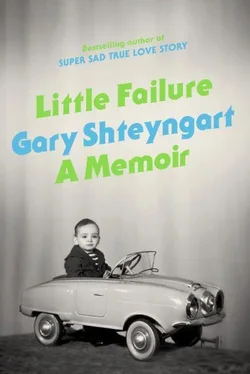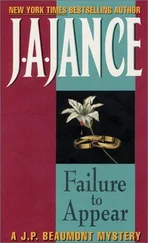Meanwhile Car & Parking and the other Publishers Clearing House magazines are starting to pile up, taunting us with many hot naked centerfolds of the new Porsche 911, the official sports coupe of Reagan-era excess. We reluctantly begin to cancel our subscriptions to all of them, except for Isaac Asimov’s Science Fiction Magazine , a small, square little number with the drawing of an exciting molting space creature on the cover hugging a boy in its claws.
Our dreams of being instantly rich are finished, but we are moving up nonetheless. We are saving every kopeck that comes our way via my father’s junior engineering job and my mother’s typing. I have my Eastern Air Lines plane, my pen, my broken Monkey, my Nazi stamp collection, my circumcised penis, the Mozart candy wrapper from the Vienna airport, the secret medal of Raphael’s Madonna del Granduca (will they throw me out of Hebrew school if they find out?), All Rome, Florence , and Venice , my Soviet atlas, and a bunch of donated T-shirts. My mother has the size 2 Harvé Benard business suit. My father has made a fishing rod out of a stick. Pounds of disgusting marked-down farmer’s cheese and kasha will feed us until we die of sadness, and if I don’t clear my plate of that warm soggy shit the thunderclap of Papa’s hand rings against my temple (Mama: “Just don’t hit the head!”) or Mama’s silence will make me consider taking my own life to everyone’s laughter.
Who are we?
Parents: My bedniye . We are poor folk.
Why can’t I have the Monkey with both hands?
Parents: We are not Americans.
But you both have jobs.
Parents: We have to buy a house.
Yes, a house! The first step to Americanism. Who needs two-handed Monkey when we will soon have our own quasi-suburban home? And I don’t fully understand the importance of these “action” figures anyway, when my pen and my Eastern Air Lines jet can fly all over the world if I only close my eyes and let it be so. “Zhhhh … Mmmmmmm.” How much more action do you want? But at lunchtime the SSSQ boys do like to take out their Lukes and Obi-Wans and Yodels and set them on their desks to demonstrate just how much property falls within their purview. They talk in their already raspy Jewish voices: “I threw out my old Yodel because the paint on his ears was falling off and then I got two new ones and a Princess Lay-uh just so Ham Solo could do her.”
Me: “Vow.”
But before you can show off your Monkey and Yodel, indeed before you can have anyone “over,” you need to have a proper house, not some cheap refugee craphole with folding army cots and drunk Step-grandfather Ilya with a patched-up, oozing hole in his stomach from some insane surgery.
Only it can’t be a whole house, because a whole house in the truly white sections of eastern Queens — Little Neck, Douglaston, Bayside — costs around $168,000 (roughly $430,000 in 2013 dollars), and that nut is too big to crack with our small Soviet rodent teeth. But kindly Zev, the young Kew Gardens Jew who acts as our unofficial adviser, tips us off to a development off the Long Island Expressway in Little Neck called Deepdale Gardens, sixty acres of affordable garden apartments built in the 1950s for returning servicemen. As me and Mama and Papa have been fighting in the Cold War since birth, we are entitled to one, too.
The savings begin in earnest. What am I talking about? For our bloodline, the savings have been in earnest since two thousand years before Christ. A three-bedroom apartment in Deepdale Gardens will cost $48,000, and 20 percent of it—$9,600—has to be tendered in cash. Everyone is conscripted to help. Our local mailman, whom we know from Young Israel synagogue, will chip in $400 without interest. My parents’ Russian friends help out, $1,000 here, $500 there, usually at 15 percent interest per annum. This is how the system works, they lend to you, eventually you lend to them, until everyone has a home away from the minorities. On the back of an address book my parents keep the sums, and I follow along with them. March 12: $6,720. $6,720 divided by $9,600 = 70 percent. We’re more than two-thirds of the way there! When my parents come back from seeing their friends I await them with the address book and the question: “Odolzhili nam?” Have they lent us money?
Sadly, our first address—252-67 Sixty-Third Avenue, Little Neck, Queens, 11362—is mostly numerical; there is no “Oak Harbour Lane” or “Pine Hill Promontory” or “Revolutionary Road.” But because each address contains just two apartments, a lower and an upper unit, there is no need to add “Apt. 2.” Which means that whenever we have to write our addresses out in SSSQ, I make sure the other children see it, hoping they will think this is an entirely private house, like the one belonging to the liberals’ son with the front and back yards.
The beauty part is that the apartment does have a second level, an attic, which is accessed by a splintery, retractable wooden ladder that scares me to death, inciting memories of the special ladder my father had built me in Leningrad to help me conquer my fear of heights. Up in the musty, woodsy attic I close my eyes and pray over the intense Republicanism that is the birthright of every Soviet Jew in the time of Reagan. This attic that is above our living quarters, this dank storage space with its creaky floorboards, belongs to us and to no one else. I close my eyes and feel the power of ownership.
Ours, ours, ours .
We are climbing upward! Past the welfare queens, past the Spanishers with their transistor radios, up to the working-class white Catholics with the Yankees pennants who populate our courtyard. Adonai Eloheinu , one day let us climb up to the Solomon Schechter Jews in how much money we have, so that those Jews can be our friends, too, and we will all own station wagons together and talk about which foods are K(osher)-Pareve and which are not. We didn’t win the ten million from the Publishers Clearing House. They lied to us and maybe we should even “sue” them. But we got even in our way. We bought our own cooperative garden apartment, and now even the peaked attic roof above my head is ours. *
Let me tell you what else is ours. There is a living room with a cottage-cheese ceiling and a small closet with a bookshelf built directly into the closet door! You can store Papa’s fishing stick inside the closet and put books on the outside of it. Here we display the trashier American novels we find on the street curb with the pictures of women and men kissing each other on horseback and a special hardcover copy of Leon Uris’s Exodus . The furniture will be the Romanian ensemble we brought from Russia: the already mentioned dining table, with an extra leaf for when kindly Zev and our other American supporters come over. There is a credenza, equally orange and glowing, upon which two Jewish menorahs are placed when visitors come, one in front of the other, one borrowed from a perch atop my mother’s Red October piano, as if to say that here Chanukah is a yearlong proposition. Beneath our feet there is a red shag carpet upon which I like to play with my pen. The problem is that the carpet is ragged, and there are many nails sticking out. Often, I will tear off a small piece of my arm during play, and I begin to mentally map the living room floor, careful to avoid major injury. What’s missing from this living room ensemble?
The Television. Except for Leon Uris and his tales of Israeli derring-do, our house is Russian down to the last buckwheat kernel of kasha. English is the language of commerce and work, but Russian is the language of the soul, whatever that is. And television, it is clear — by the screaming, honking, spoiled American kids around us — is death. After we come to the States, many of my more adaptable fellow immigrants quickly part ways with their birth languages and begin singing the opening tune to a show about a black man with an aggressive haircut named Mr. T. The reason I still speak, think, dream, and quake in fear in Russian has to do with my parents’ dictum that only Russian be spoken in the home. It’s a trade-off. While I will retain my Russian, my parents will struggle with the new language, nothing being more instructive than having a child prattle on in English at the dinner table.
Читать дальше












